Referrals & Resources
A practical guide for where to turn when a student or child needs more support. Use these resources to connect families with help both inside and outside of school.
School-Based Supports
- Teacher or Advisor: First point of contact for classroom concerns and academic support.
- School Counselor: Social-emotional support, individual check-ins, and guidance on next steps.
- School Psychologist: Assessments, interventions, and mental health strategies.
- Dean or Administrator: For behavioral concerns and discipline-related referrals.
- Special Education Team: If a child may need learning accommodations or an IEP review.
Community Resources
- Local Youth Programs: After-school clubs, mentoring, and safe spaces.
- Community Mental Health Clinics: Sliding-scale counseling and therapy options.
- Faith-Based Organizations: Churches, mosques, and community centers offering family support.
- Nonprofits & Hotlines: Groups focused on youth development, crisis response, or family support.
Crisis & Emergency Lines
- 988 Suicide & Crisis Lifeline: Call or text 988 for immediate help in the U.S.
- 911 Emergency: For urgent safety, health, or medical emergencies.
- Childhelp National Child Abuse Hotline: 1-800-422-4453 (24/7 confidential support).
Why It Matters
Having a clear list of referral pathways helps schools and families respond quickly when a child is struggling. Access to timely resources builds trust, ensures safety, and strengthens long-term resilience for students.
